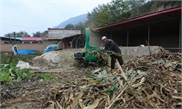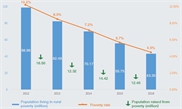Poverty campaign targets ethnic minority regions
Ethnic minority areas have been a major focus of China's nationwide poverty alleviation campaign in the past five years.
Breaking the poverty cycle in rural China
Qianqian says little and toys with a corner of her coat, a hand-me-down from her sister. The 11-year-old lives in mountainous Xingchong Village, central China's Hubei Province. Her mother died long ago and her father works in the cities. Her sister, at 20 already mother to a 2-year-old, lives and works in Beijing.
Xinjiang raises over 600 mln USD for poverty-relief relocation in 2017
Northwest China's Xinjiang Uygur Autonomous Region raised 4.17 billion yuan (about 627 million US dollars) in 2017 in relocation funds as part of its poverty reduction drive.
NBS statistics point to sound economic growth, poverty alleviation for China in the last 5 years
China's economy has achieved moderate but stable and sound development in the last five years, with economic structures becoming optimized and people's living standards improving against the backdrop of a difficult adjustment to sluggish global economic growth and a domestic economic new normal.
China uses Internet to lift rural regions out of poverty
As part of efforts to lift 43 million people out of poverty, China is harnessing the power of the Internet in a groundbreaking online initiative.
China moves to improve use of anti-poverty funds
China on Tuesday released a new system to assess the way local governments manage poverty relief funds, which will give with more weighting to the effectiveness of the funds.
Premier Li stresses proper relocation arrangements in poverty relief
Chinese Premier Li Keqiang has stressed proper arrangements in relocating people from poverty-stricken communities to more developed areas as a means of poverty relief.
Poor poverty relief results can stymie official careers
China has set a stricter accountability system to evaluate officials' performance on poverty alleviation, punishing officials who fail to accomplish missions or barring them from promotion.
China lifts 13.9 million people out of poverty each year
China lifted 13.91 million people out of poverty each year from 2012 to 2016, and the annual per capita income in impoverished rural areas has grown 10.7 percent every year, according to a report from the State Council Tuesday.
Senior political advisors discuss targeted poverty relief
China's senior political advisors met Monday to offer suggestions on targeted poverty relief.
China's graft watchdog exposes corruption in poverty relief
China's top disciplinary watchdog has named a number of grassroots officials implicated in abuse of poverty relief funds.
China launches English, French editions of Xi's book on poverty relief
The English and French editions of Chinese President Xi Jinping's book on poverty relief were launched on Wednesday at the ongoing 24th Beijing International Book Fair.
Hundreds of thousands freed from poverty in Tibet in 2016
Some 150,000 rural residents in southwest China's Tibet Autonomous Region escaped poverty last year, according to the Tibet Poverty Alleviation Office.
Business strategies help alleviate poverty: study
Researchers at the University of Michigan (UM) have compared several business strategies to explore how each impacted young children.
China’s poverty relief achievements: 2012-16
China has raised 55.64 million people from poverty since 2012.
Xi stresses battles against risks, poverty, pollution
Chinese President Xi Jinping has stressed efforts to prevent and defuse major risks, relieve poverty as well as prevent and control pollution.
Vice premier urges education's role in poverty reduction
Chinese Vice Premier Liu Yandong Saturday called for enhancing education in underdeveloped areas amid efforts to fight poverty.
Top graft-buster stresses enforcement of discipline in poverty relief
Wang Qishan, chief of the discipline watchdog of the Communist Party of China (CPC), has stressed the role of supervision and enforcement of discipline in the country's poverty relief work Monday.

